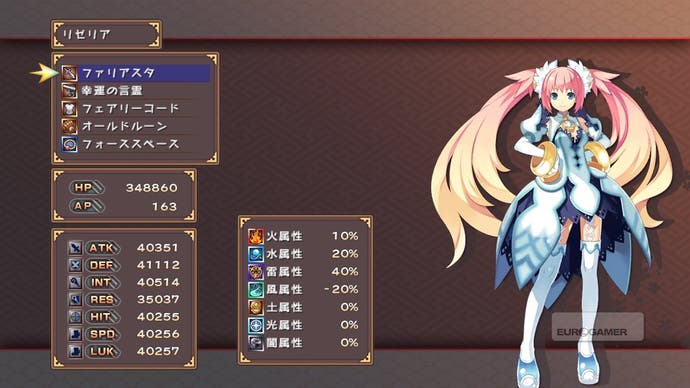Trinity Universe
Nether say die.
This is the heart of the game, but there are also two stories to get through. Each follows a new character - Rizelea the Valkyrie and Kanata the Demon Dog King - although the difference is really only evident in the numerous story sequences.
It's these that will really test the patience of all but the hardiest JRPG apologist; rambling, scatological conversations told through omnipresent dialogue boxes and sparsely animated sprites. During the game's first few hours, you'll spend more time watching the cast bicker about haircuts, tea and boobs than you will battling monsters.
You can at least set the game to automatically advance through these sections, rather than hitting X at the end of every line, but the temptation to speed through them, or make a sandwich, is increasingly hard to resist as these endearing but ultimately inconsequential indulgences drag on and on.
Fans of Disgaea and Atelier will no doubt relish the chance to see characters like Etna and Prinny realised in full polygon 3D for the first time, but this isn't a game that will be winning any beauty awards.
The dungeon environments are rigidly designed, character models have a PS2 whiff about them, the camera control is sticky and the monsters - while suitably wacky - are hardly impressive either. The looped music, as with so many JRPGs, sounds like the accompaniment to the world's most annoying waltzer funfair ride.

Such technical considerations are unlikely to concern the game's target audience, however. Like Disgaea, this is a game designed for the long haul. The dungeons aren't an end in themselves, but stepping stones on the path to bigger and bigger damage statistics.
In fact, if you find a dungeon floating around that you really like, you can buy special "anchors" to hold it in place so you can mine it for trinkets over and over. The game throws out random loot with giddy abandon, so it's unlikely you'll ever run into the same combination of items twice, even if the actual environments seem to be constructed from the same handful of textures over and over.
Of the two parents, Trinity Universe certainly seems to favour Disgaea more than Atelier, at least based on the early sections of our half-translated preview code. It's sarcastic and post-modern, with characters commenting on the fact they're in a videogame, mocking JRPG clichés or expressing their dramatic pauses through self-consciously distracting "..." speech bubbles. It's funny, but only for the very patient or (let's be honest) very nerdy.
It would be nice to think that the dungeon-crawling might be spruced up before Trinity Universe gets its Euro release at the end of June, but since the game has been out in Japan for over six months that seems unlikely. With two existing game universes to cram into its original setting, and three distinctive development teams sharing the code, there was always a danger that the old adage about too many cooks would be proven correct.
Certainly, there are plenty who will take one sip and declare the broth spoiled. For the devoted niche being targeted, however, this acquired taste might be just the ticket.
Trinity Universe is due out for PS3 on 26th June.
